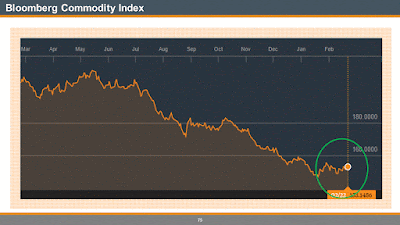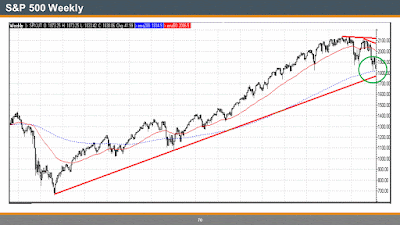Throwing Out The Old Rules?
Smarter folks than me are suggesting that once again: "this time it's different"!
(Bloomberg) --
Global financial markets are in turmoil because inflation expectations have
declined and central banks aren’t in a position to prop them back up, Bob
Prince, co-chief investment officer of the world’s largest hedge fund,
Bridgewater Associates, wrote in a note dated Feb. 17.
“Inflation
expectations are falling rapidly” in the U.S.
despite above-potential growth and monetary policy
stimulus, pushing up the real return on simply holding cash, Prince wrote in
the note, a copy of which was obtained by Bloomberg. This pressure makes stocks
and other financial assets less attractive, and is what’s driving a
stock-market sell-off.
“Central
bankers and governments need to contain the deflationary forces before the
pressures are too great to control,” he concluded.
At the same time, as a result of a weaker C$, consumer prices in Canada have bounced higher:
But now that the "transitory" effects of low energy prices are leaving the equation, CPI has come back into line with the "core" CPI. But, there are now the "transitory" effects of a weaker C$ that have pushed food costs to higher levels.
Prices for fresh vegetables were up 18.2% in the 12 months to January, following a 13.3% increase in December. The other fresh vegetables index, which includes broccoli, cauliflower, celery and peppers among other products, registered its largest year over year increase (are you ready for this?)
22.7% !!
(since April 2009)
As a wealth manager, something that we have to be continuously on guard for is the cost of living for our clients as we try to project cash flow needs into future years.
This makes it rather interesting when you get intelligent financial market comentators pontificating on declining "inflation expectations" when the reality that most regular folks are facing is far from the case (unless you have an aversion to fresh vegetables).
If the consumer is feeling like they don't have increased cost of living issues, they will be less demanding for wage increases, which is the other "shoe" in the inflation picture. But now that we have adjusted to lower energy costs, we have to adjust to higher veggie costs.
The Bank of Canada (and most of the other central banks) have a 2% target for "core" inflation. The Bank of Canada is "on target". Other central banks are imposing monetary policies to get to target.
The big question, ultimately, is what is happening to the world's biggest economy:
A similar story, the core cost of living as reported in the US yesterday is at 2.2% above the 2% target (the US Federal Reserve monitors the Personal Consumption Expenditure (PCE) Core Price Index which will be released at the end of the month).
Wages, according to the most recent US Employment Situation Report have risen 2.4% over the course of the last 12 months.
So what are the current consumer expectations for inflation?
Not even close to negative.
That is what it would need to be to have a deflationary environment.
Can that change in the future? perhaps yes, but it will take a very deep recession to do so and that is not yet close to reality, nor do the probabilities of it happening suggest that it is going to.
Are there some structural issues (debt issues) making risk assets less desirable, certainly, but like everything in financial markets, those who are positioned to take advantage of uncertainty and volatility will be quoted on the front pages of the financial media hoping to encourage greater levels of fear.
In the meantime, central banks are, hopefully, exercising monetary policies that will keep economies growing and inflation well above the zero level.
Stocks are getting cheaper (being sold) because they were expensive and earnings were not keeping up with expectations.
No the rules have not changed and like every economic cycle we have endured, asset prices will likely get sold to levels that are not warranted and good asset managers will be positioned accordingly to pick up good quality assets cheap.
We wait for that moment.


















